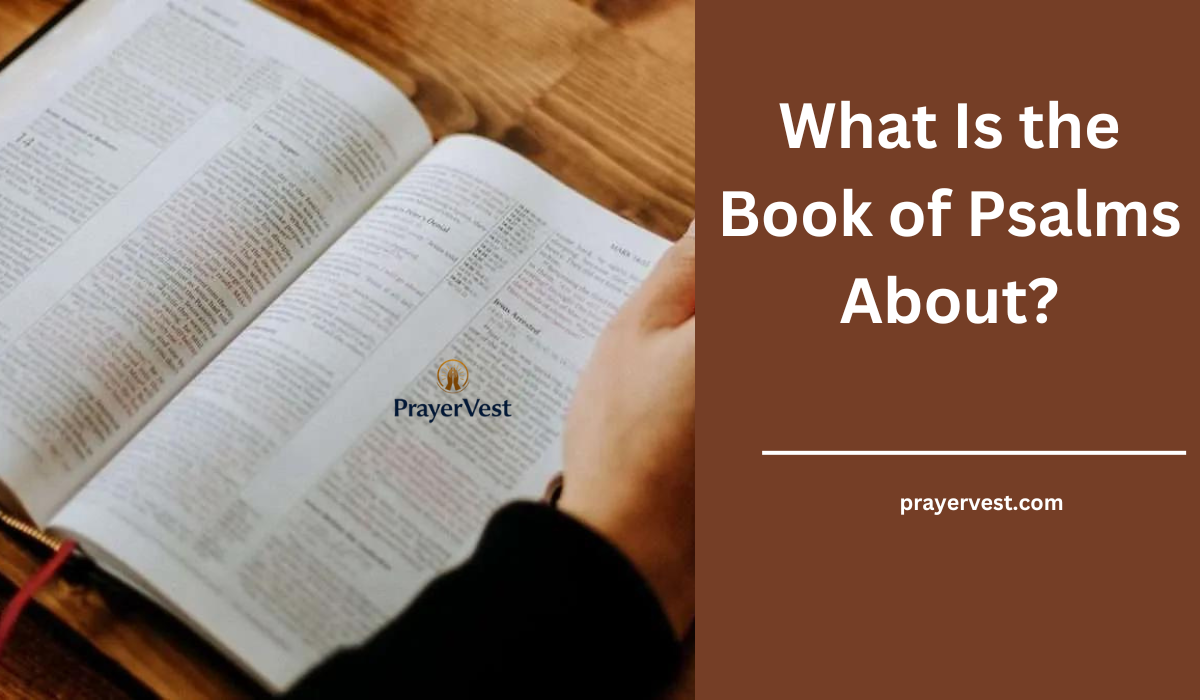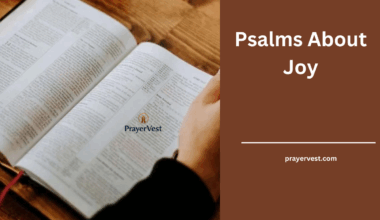The Book of Psalms is one of the most beloved and widely read books in the Bible. Whether you’re seeking comfort, offering praise, or looking for words to express sorrow or joy, the Psalms provide a spiritual language for every human experience.
The Book of Psalms stands as one of the most poetic, emotional, and theologically rich books in the Bible. Revered by Jews and Christians alike, it offers a unique window into the heart of worship, the anguish of suffering, and the joy of divine presence.


But the key question is, what exactly is the Book of Psalms about? Who wrote it? What are its main themes? And how can it shape your spiritual life today?
In this article, we will explore everything you need to know about the Book of Psalms – from its authorship and structure to its enduring impact on worship and daily living.
What Is the Book of Psalms?
The Book of Psalms, also known as the Psalter, is a collection of 150 poetic songs, prayers, and hymns found in the Old Testament of the Bible. These sacred writings express the spiritual journey of God’s people over centuries. In Hebrew, it is called “Tehillim,” meaning “Praises,” which emphasizes its core focus on worship and adoration.
Written in Hebrew poetic style, the Psalms use literary techniques such as parallelism, repetition, metaphor, and imagery to communicate emotion, doctrine, and divine truth. Whether expressing despair, gratitude, or adoration, the Psalms articulate the full spectrum of human emotion in relation to God.
Each Psalm is a standalone piece, but collectively, they form a profound tapestry that captures a wide range of human emotions and divine encounters. The Psalms were written over a span of hundreds of years and compiled into their current form likely by the time of the post-exilic period (after 500 BCE).
The Psalms cover every facet of life: joy, lament, justice, thanksgiving, confession, trust, and reverence. More than just literature, they were (and are) used as a guide for prayer, worship, and meditation.
Who Wrote the Book of Psalms?
While King David is the most well-known contributor—credited with writing at least 73 Psalms—he is not the sole author. The Book of Psalms is a compilation from multiple authors across different generations. Here’s a breakdown of the known contributors:
1. King David (73 Psalms)
David is credited with writing nearly half of the Psalms. His contributions reflect a deep emotional and spiritual intimacy with God. Some of the most well-known Psalms, including Psalms 23, 51, and 139, are attributed to him.
2. Asaph (12 Psalms)
Asaph was a Levite and one of the leaders of David’s choir. His Psalms (e.g., 50, 73–83) often focus on God’s justice and covenant.
3. The Sons of Korah (11 Psalms)
A family of temple musicians, their Psalms (e.g., 42–49, 84–85, 87) typically emphasize God’s presence and majesty in the temple.
4. Solomon (2 Psalms)
David’s son and successor, Solomon is credited with Psalms 72 and 127, which focus on royal themes and divine blessing.
5. Moses (1 Psalm)
Psalm 90, the oldest Psalm, is attributed to Moses. It reflects on God’s eternity and human frailty.
6. Heman and Ethan the Ezrahites
These lesser-known figures authored Psalms 88 and 89, respectively. Their contributions focus on lamentation and covenantal hope.
7. Anonymous Authors
Nearly 50 Psalms have no named author. These anonymous compositions carry significant spiritual and theological weight despite their unknown origins.
These writers composed Psalms across different eras of Israel’s history, including the monarchy, exile, and post-exilic periods.
Historical and Literary Context
Understanding the Psalms requires knowledge of ancient Israelite history and literary traditions. The Psalms were written across several eras:
- **United Monarchy (David and Solomon)
- Divided Kingdom
- Assyrian and Babylonian Exile
- Post-Exilic Period**
The Psalms reflect national and individual experiences, often mirroring Israel’s spiritual condition.
Structure of the Book of Psalms
The Book of Psalms is divided into five sections, which mirror the structure of the Pentateuch (the first five books of the Bible). Each division ends with a doxology (a short hymn of praise to God).
The Five Books:
Book I (Psalms 1–41) – Emphasis on personal lament and trust in God, mostly authored by David.
Book II (Psalms 42–72) – Includes more communal prayers and Psalms by the sons of Korah and Asaph.
Book III (Psalms 73–89) – Reflects national laments and spiritual crisis.
Book IV (Psalms 90–106) – Focuses on God’s eternal kingship and faithfulness.
Book V (Psalms 107–150) – A crescendo of praise, thanksgiving, and declarations of God’s sovereignty.
Each section reflects different themes and historical settings, yet all work together to form a unified spiritual narrative.
Major Themes in the Book of Psalms
One of the reasons the Psalms remain so relevant is the depth and diversity of themes they cover. Here are the primary themes you’ll encounter:
1. Worship and Praise
Psalms constantly urge believers to lift up God’s name (e.g., Psalm 100, Psalm 150).
2. Lament and Suffering
Many Psalms voice pain, confusion, and sorrow—providing comfort for the grieving (e.g., Psalm 13, Psalm 88).
3. Thanksgiving
Expressing gratitude for God’s blessings and deliverance (e.g., Psalm 30, Psalm 107).
4. Trust and Confidence
Reinforcing unwavering faith in God despite life’s trials (e.g., Psalm 46, Psalm 91).
5. God’s Justice and Sovereignty
Affirming that God is a just ruler who sees and acts righteously (e.g., Psalm 9, Psalm 96).
6. Messianic Prophecy
Foreshadowing Jesus Christ and the coming Messiah (e.g., Psalm 22, Psalm 110).
7. Repentance and Forgiveness
Modeling honest confession and restoration (e.g., Psalm 51, Psalm 32).
These themes resonate across generations and are relevant to every believer’s journey.
Types of Psalms Explained
The Psalms can be categorized into several types based on their content and purpose:
1. Hymns of Praise
Celebrate God’s attributes and deeds (e.g., Psalm 8, Psalm 103, Psalm 145).
2. Lament Psalms
Cry out to God in distress, often asking for help or justice (e.g., Psalm 22, Psalm 77, Psalm 130).
3. Thanksgiving Psalms
Give thanks for God’s help and blessings (e.g., Psalm 30, Psalm 92, Psalm 116).
4. Royal Psalms
Speak of kingship, especially that of David and the future Messianic King (e.g., Psalm 2, Psalm 72).
5. Wisdom Psalms
Offer moral and spiritual instruction (e.g., Psalm 1, Psalm 37, Psalm 119).
6. Imprecatory Psalms
Call for God’s judgment upon the wicked (e.g., Psalm 35, Psalm 69, Psalm 109).
7. Messianic Psalms
Prophesy the life, suffering, and reign of Jesus Christ (e.g., Psalm 22, Psalm 110).
Why Is the Book of Psalms Important?
The Book of Psalms is more than ancient poetry—it’s a guide for worship, prayer, and spiritual healing.
Reasons Psalms Matter Today:
Emotional Honesty: Psalms express raw emotions—joy, grief, hope, despair—making them relatable and therapeutic.
Spiritual Depth: They help believers deepen their faith through meditation and prayer.
Liturgy and Worship: Used in Jewish synagogue services, Christian hymns, and church liturgies worldwide.
Connection with God: Provide words when we don’t know how to pray.
Famous and Most Quoted Psalms
These are some of the best-known and most quoted Psalms in the Bible:
Psalm 23: Trust and Comfort
“The Lord is my shepherd.” Offers assurance of God’s guidance and protection.
Psalm 51: Repentance
“Create in me a clean heart, O God.” David’s heartfelt cry after his sin with Bathsheba.
Psalm 91: Divine Protection
“He who dwells in the shelter of the Most High.” Declares safety in God’s refuge.
Psalm 119: Love for God’s Word
The longest chapter in the Bible, emphasizing the power of Scripture.
Psalm 1: Contrast of Righteous and Wicked
Blessed is the one who delights in the law of the Lord.
These passages are memorized, sung, and prayed across generations and cultures.
How to Read and Understand the Psalms
Interpreting the Psalms requires a thoughtful and prayerful approach:
Tips for Studying Psalms:
Understand Hebrew Poetry: Look for parallelism, repetition, and imagery.
Context Matters: Know the historical background and intended audience.
Use Study Tools: Commentaries, concordances, and translations can illuminate deeper meanings.
Pray Through the Psalms: Use them as conversation starters with God.
Apply Personally: Reflect on how each Psalm speaks to your life situation.
Psalms in Daily Life
The Psalms are incredibly practical. Here’s how they can enrich your daily spiritual practice:
Ways to Use Psalms Daily:
Morning Devotions: Start your day with a Psalm of praise or trust (e.g., Psalm 5, Psalm 143).
Prayer and Meditation: Read slowly, reflect, and pray the words back to God.
Times of Trouble: Turn to lament or comfort Psalms (e.g., Psalm 34, Psalm 91).
Journaling: Write your own Psalms inspired by your life and faith journey.
Worship Services: Incorporate Psalms in music, readings, or sermons.
Conclusion: Rediscovering the Power of Psalms
The Book of Psalms is a timeless treasure. It captures every human emotion and points it back to God in worship, trust, and prayer. Whether you’re overwhelmed, overjoyed, or simply seeking God, the Psalms speak into your situation with grace and truth.
Take the next step: Open the Book of Psalms and start reading. Let its words guide your thoughts, prayers, and praises.






